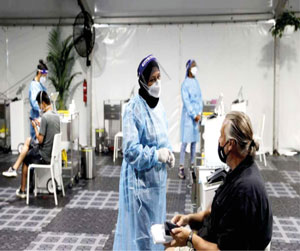Scientists have detected cases of a new variant of SARS-CoV-2, which is the virus that causes COVID-19, in a number of countries.
Omicron (B.1.1.529) has an unprecedentedly large number of mutations in the part of its genome that encodes a key section of its spike protein, which the virus uses to infect host cells.
This suggests that Omicron may be able to evade some of the immune protection afforded by vaccines, many of which are based on the original spike protein, and past infections. Travelers looking at a flight notice board displaying canceled flights at OR Tambo International Airport in Johannesburg, South Africa, on November 27, 2021.
On November 16, 2021, there were 136 daily recorded cases of COVID-19 in South Africa. By November 25, 2021, that number had risen to over 1,200.
More than 80% of these cases were in the densely populated province of Gauteng, which includes Johannesburg and Pretoria.
Researchers estimated that the R-value, which is the average number of new cases caused by each infection, was 1.47 for South Africa as a whole. If R is more than 1, an outbreak will grow exponentially.
In Gauteng province, R was 1.93. Scientists at the Centre for Epidemic Response and Innovation (CERI) in Stellenbosch, South Africa, believe that a new variant of the virus known as Omicron (B.1.1.529) is responsible for these worrying figures.
There have been three previous peaks of infection in South Africa during the course of the pandemic, with the third due to the Delta variant. The latest surge coincides with the first detection of Omicron by scientists.
Scientists have sequenced around 100 confirmed cases of Omicron infection in South Africa. Most of the cases have been in Gauteng. The new variant is also present in Botswana, Hong Kong, Europe, Canada, Israel, Japan, the United States, and elsewhere.
“The main message today is that you have to know the enemy in order to fight,” said Prof. Tulio de Oliveira, Ph.D., the director of CERI, at a virtual news briefing on November 25, 2021.
He went on to say that the variant’s genome contains “a very unusual constellation of mutations.” Many of these are confirmed or predicted to either help the virus evade the immune system or increase its transmissibility.
He said that there are around 50 mutations across the entire genome of the virus and more than 30 in the part that codes for its spike. This is the protein that allows the virus to invade its host cells.










